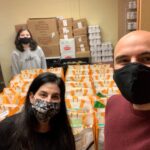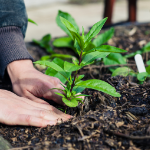Individual Actions, Community Impact: A Message for the High Holidays
The high holidays are a time when we come together as a Jewish community in celebration and solemn observance; yet, when you consider the holidays, our observance is in fact very much focused on individual reflection, atonement, and giving. This time of year which holds great significance to our collective all begins with our individual choices and acts.
Between Rosh Hashanah and Yom Kippur, we reflect on our individual actions – what could I have done differently – and review our choices – what am I proud of this year – in an attempt to honestly evaluate ourselves. We evaluate, we redeem, we give, and we set our own path for the year ahead and, while doing so, we create a more connected, supportive, compassionate community.
This theme felt incredibly poignant given all we have endured and continue to face because of the pandemic.
It has taken each of us making individual choices – helping a neighbor, giving a donation, wearing a mask, getting vaccinated – to bring our community to a better place, a more hopeful place, this fall compared to last fall.
Over the past year, JFCS has witnessed first-hand how the generous actions of one individual can have far reaching effects, like the mother-daughter efforts of Sujaya and Anushka Majumdar who hand-sewed masks to donate to JFCS and other local organizations to distribute to clients in need, and Samantha Burnside, a local teen who rallied family and friends to raise almost $1,000 for the JFCS food pantries. This July, the entire world witnessed how the voice of an individual, Olympic gymnast Simone Biles, could raise awareness, and inspire others to prioritize their own mental health.
One person’s action can make all the difference to a neighbor, a community, a country, a world.
While we have come so far since last year, there are still many who need our help on the long road to healing. There are the seniors working through the impact of a year of isolation, there are the individuals struggling with mental and emotional turmoil, and there are families continuing to live in a state of financial uncertainty, unsure if they can afford their next meal.
We turn to you, to your power as an individual to act. In honor of the high holidays, we ask that you consider how you can make a small choice that can benefit the community.
A donation now means that when you reflect next year, you already know you have made a difference, an action to be proud of.
Michelle Napell, Executive Director
Jill Jaclin, Board President
 Guilt is a normal, healthy emotion. Experiencing it when you’ve hurt someone or when you’ve made a mistake is a good sign—it means you have a conscience. But sometimes, you may experience unjustified guilt.
Guilt is a normal, healthy emotion. Experiencing it when you’ve hurt someone or when you’ve made a mistake is a good sign—it means you have a conscience. But sometimes, you may experience unjustified guilt. Taking Small Steps for a Big Impact
Taking Small Steps for a Big Impact Group Efforts
Group Efforts Go the Extra *MILE*
Go the Extra *MILE* The COVID-19 vaccine provides reassurances in keeping us physically protected, yet it does not automatically reduce or eliminate our anxiety, change in that way is going to take time and patience after all we have endured the past 18 months.
The COVID-19 vaccine provides reassurances in keeping us physically protected, yet it does not automatically reduce or eliminate our anxiety, change in that way is going to take time and patience after all we have endured the past 18 months.  As restrictions start to ease, more and more employees are returning to the workplace, no doubt with anxious feelings, questions, and possible concerns. Feeling dread and uncertainty is perfectly normal…
As restrictions start to ease, more and more employees are returning to the workplace, no doubt with anxious feelings, questions, and possible concerns. Feeling dread and uncertainty is perfectly normal… We have all made significant adjustments to our lives in the past year. Adapting to life during a global pandemic was difficult; now that vaccines are widely available, we are still facing challenges about our personal comfort levels being in the community and returning to work.
We have all made significant adjustments to our lives in the past year. Adapting to life during a global pandemic was difficult; now that vaccines are widely available, we are still facing challenges about our personal comfort levels being in the community and returning to work. Shavuot also is a time of great rejoicing, both in community in the synagogue and at home. Ashkenazi tradition includes the eating of dairy foods, such as blintzes and cheese cake, because the Torah is likened to milk and honey. Sephardic communities have more elaborate Shavuot dishes many of which also involve cheese but in different forms such as special rice and cheese pies and Turkish-style rice pudding (sutlatch).
Shavuot also is a time of great rejoicing, both in community in the synagogue and at home. Ashkenazi tradition includes the eating of dairy foods, such as blintzes and cheese cake, because the Torah is likened to milk and honey. Sephardic communities have more elaborate Shavuot dishes many of which also involve cheese but in different forms such as special rice and cheese pies and Turkish-style rice pudding (sutlatch).  Through two recent donations, JFCS is growing a program within our food pantry to encourage and empower clients to grow their own food. Recently, the agency was able to provide tomato plant seedlings to clients. JFCS agency has a relationship with
Through two recent donations, JFCS is growing a program within our food pantry to encourage and empower clients to grow their own food. Recently, the agency was able to provide tomato plant seedlings to clients. JFCS agency has a relationship with  Why encourage clients to grow their own food?
Why encourage clients to grow their own food? How Can You Help?
How Can You Help?
